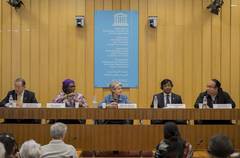
GCED Basic Search Form
Quick Search
You are here
News

Multilingualism was celebrated as the theme of International Mother Language Day held at UNESCO Headquarters, Paris on February 21, 2017.
UNESCO joined the International Organisation of La Francophonie (OIF) to mark the yearly celebration under the theme “Towards Sustainable Futures through Multilingual Education”.
This year’s focus was on fostering sustainable development by ensuring learners have access to education in their mother tongue and in other languages.
Multilingual education based on mother tongue contributes to achieving all SDGs by linking the local knowledge with the global knowledge, addressing common challenges and acting together to find solutions.
It is through mastery of the first or mother language that the basic skills of reading, writing and numeracy are acquired.
In addition local languages - especially minority and indigenous languages - transmit cultures, values and traditional knowledge, thus playing an important role in promoting sustainable futures.
Confidence and self-esteem
During the opening ceremony, UNESCO Director-General Irina Bokova, said: “Education and information in the mother language is absolutely essential to improving learning and developing confidence and self-esteem, which are among the most powerful engines of development.”
Ms Youma Fall, Director of French Language, Culture and Diversity from OIF stressed the importance of national languages for the promotion of cultural diversity and as the basis for all creativity.
H.E. Mr M. Shahidul Islam, Ambassador of Bangladesh to France and Permanent Delegate to UNESCO stated that the people of Bangladesh have a special attachment to the International Mother Language Day, because this day is an important milestone in their national history.
He underlined that Bangladesh continues to play an active role in supporting UNESCO’s efforts to promote linguistic and cultural diversity. In 2016, the Government of Bangladesh established the International Mother Language Institute to act as a regional hub to conduct research to promote and protect all mother languages including those on the verge of extinction or already extinct.
H.E. Mr. Sergio Cáceres García, Ambassador and Permanent Delegate of Bolivia to UNESCO, shared the experience, richness and challenges from integrating 36 indigenous languages across the country. He said Bolivia was committed to intercultural and multilingual education and the use of mother tongues in learning and in all aspects of life as it contributes to development.
The International Mother Language Day celebration explored the use of quality multilingual education to achieve sustainable futures, facilitating participation and action in society, giving access to new knowledge and cultural expressions, and thus contributing to building global citizenship.
